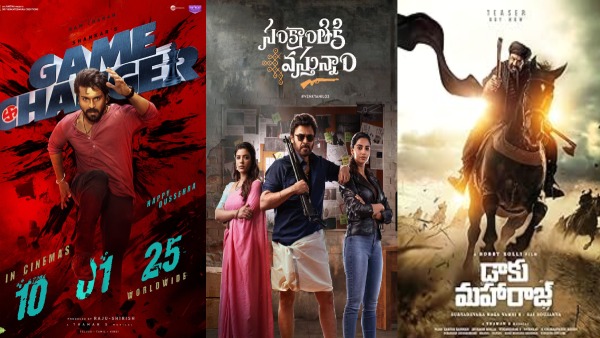Sankranthi is a Celebratory Season for Telugu Films
Sankranthi is widely acknowledged as a major harvest festival in South India, particularly in Andhra Pradesh, signifying the new year’s commencement. While many view it primarily as a celebration for farmers, I believe it equally serves as a vibrant cinematic celebration. This article explores its dual significance.
In the Telugu states, Sankranthi occurs in the second or third week of January, marked by joyful festivities and extended holidays. Farmers, buoyed by their harvest, gather with family and friends for nearly a week of celebration. This festive atmosphere creates a sense of community and entertainment, with cinema playing a pivotal role. Families flock to theaters to enjoy newly released films during this joyous period, complementing their festivities with games, social gatherings, and more.
Renowned stars from the 1990s, such as NTR, particularly capitalize on this festive window, which rivals notable holidays like Dussehra and Diwali. What makes Sankranthi unique, however, is the heightened consumer spending capacity resulting from the harvest, with nearly 65% of the Andhra population engaged in agriculture. This leads to a fervent fan base that passionately supports local cinema legends like Chiranjeevi, Balakrishna, and Nagarjuna. Notably, fan rivalries are more pronounced here than in other regions.
Director Sukumar expressed the challenges he faced in ensuring that “NannakuPrematho” debuted during Sankranthi. Similarly, like how Salman Khan schedules his releases on Eid, Telugu movie stars also strive to premiere their films during this festive period.
Examining notable film releases reveals this trend clearly:
2000: Chiranjeevi’s “Annayya,” Balakrishna’s “Vamsoddarakudu,” and Venkatesh’s “Kalisundamra.”
2001: “Mrugaraju,” “Narasimhanayudu,” and “Devi Putrudu.”
2002: Mahesh Babu’s debut film “Takkari Donga” and Tarun’s “Nuvvuleka Nenu Lenu.”
2003: Ravi Teja’s “Ee Abbayi Chala Manchodu” and Mahesh Babu’s blockbuster “Okkadu.”
2004: Prabhas’s hit “Varsham.”
2005: Pawan Kalyan’s “Balu” and Siddharth’s “NuvvosthananteNenoddanta.”
2006: Ram Pothineni’s “Devadas” and Venkatesh’s “Lakshmi.”
2007: Allu Arjun’s “Deshamuduru” and Prabhas’s “Yogi.”
2008: Ravi Teja’s “Krishna.”
2009: Kodi Ramakrishna’s blockbuster “Arundhati.”
2010: NTR’s comedy “Adhurs” and Ravi Teja’s “Sambo Siva Sambho.”
2011: Ravi Teja’s “Mirapakay.”
2012: Mahesh Babu’s “Businessman” and Venkatesh’s “Bodyguard.”
2013: Mahesh Babu and Venkatesh’s “SeethammaVakitloSirimalleChettu” alongside Ram Charan’s “Nayak.”
2014: Mahesh Babu’s “Nenokkadine” and Ram Charan’s “Yevadu.”
2015: Venkatesh and Pawan Kalyan’s “Gopala Gopala.”
2016: NTR’s “NannakuPrematho,” with Sukumar’s notable efforts to finalize it for Sankranthi.
2017: Chiranjeevi’s impressive return with “Khaidi No. 150” and Balakrishna’s “Gowthami PuthraSathakarni.”
2018: Pawan Kalyan’s “Agnathavasi.”
2019: “Vinaya Vidheya Rama,” “Kathanayakudu,” and “F2.”
2020: “SarileruNeekevvaru” and “Ala Vaikunthapurramuloo.”
2021: Ravi Teja’s “Crack.”
2022: Nagarjuna’s “Bangarraju.”
2023: Chiranjeevi’s “WaltheruVeerayya” and Balakrishna’s “Veerasimha Reddy,” both produced by Mythri Movie Makers.
In 2024, we saw Mahesh Babu’s “Guntur Karam,” Venkatesh’s “Saindhava,” Ravi Teja’s “Eagle,” and Vijay Deverakonda’s “Family Star,” along with Prasanth Varma’s pan-India blockbuster “Hanuman.” Sankranthi also brings business challenges and conflicts between distributors and producers over screen availability, as seen with “Hanuman” and “Guntur Karam.” However, “Hanuman” stood out in the competition and performed well at the box office, despite the weak storyline of “Guntur Karam.” This shows that even top stars cannot succeed during festival seasons if the story is not strong. Smaller-budget films like “Hanuman” can achieve box office records.
In 2025, Ram Charan’s “Game Changer,” Balakrishna’s “Daku Maharaj,” and Venkatesh’s “SankranthikiVastunnam.” Unfortunately, all three films fell short regarding their story and presentation. As Naseeruddin Shah wisely said, “The mob infuses energy,” and this energy increases when combined with festive vibes, turning the film experience into a celebration. While some may consider them silly, we hope everyone enjoyed Sankranthi and look forward to better films in the next Sankranthi celebration.






